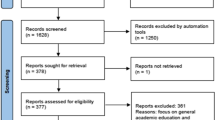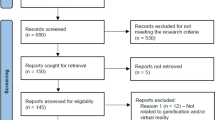Abstract
This study addresses the learning of Information and Communication Technologies (ICT) concepts by physical education and sport science students through a computer game. Its aims are: (a) the design of the prototype of a computer game aimed at supporting the development of an appropriate mental model about how a computer works by the students, and (b) the evaluation of the impact of the use of this prototype on students as to appeal, basic usability issues and learning outcomes. The most significant elements of the game prototype (narrative, characters, interface, scenarios, puzzles, gameplay) are presented in connection with the constructivist learning principles that guided the game design. A hundred and three (103) physical education and sport science students participated in the evaluation of the game prototype, which was conducted through pretest and posttest written questionnaires that elicited both quantitative and qualitative data. The data analysis showed that the game prototype was well-accepted as an alternative learning tool for ICT, compared to traditional learning tools, and that most game elements elicited average to positive responses from the students. It was also found that the game prototype had a significant positive effect on students’ knowledge regarding the concepts of input, program, output and their interplay, and that it helped certain students overcome their misconceptions and form more scientifically acceptable and elaborate mental conceptions about basic functions of a computer. Future improvements and extensions to the game as well as future research perspectives are discussed on the basis of the findings.






Similar content being viewed by others
References
Abt, C. (1987). Serious games. Lanham: University Press of America.
Alexander, P. A., & Murphy, P. K. (1998). The research base for APA’s learner-centered psychological principles. In N. L. Lambert & B. L. McCombs (Eds.), Issues in school reform: A sampler of psychological perspectives on learner-centered schools (pp. 33–60). Washington: American Psychological Association.
Amory. (2001). Building an educational adventure game: theory, design and lessons. Journal of Interactive Learning Research, 12(2/3), 249–263.
Bandura, A. (1997). Self-efficacy: The exercise of control. New York: W.H. Freeman.
Bonk, C. J., & Dennen, V. P. (2005). Massive multiplayer online gaming: A research framework for military education and training. (Technical Report # 2005–1). Washington, DC: US Department of Defense.
Chuang, T. Y., Tseng, H. Y., Liu, S. C., & Lin, Y. L. (2010). Digital game-based learning in improving students’ reasoning: A pilot study. IET Conference Publications 2010 (568 CP), 111–116.
Coffey, H. (2009). Digital game-based learning, http://www.learnnc.org/lp/pages/4970 (last accessed: 04/05/2011).
Conner, M. (1997). Informal learning, http://www.marciaconner.com/intros/informal.html (last accessed: 04/05/2011).
Connolly, T., Stansfield, M., & McLellan, E. (2006). Using an online games-gased learning approach to teach database design concepts. Electronic Journal of e-Learning, 4(1), 103–110.
Couceiro, R. M., Veloso, A. I., Papastergiou, M., & Kordaki, M. (2011). Design of a computer game for an information technology class. Revista Prisma, Especial Videojogos 2010, 14, http://revistas.ua.pt/index.php/prismacom/article/view/973/911 (last accessed: 05/09/2011).
Cross, J. (2006). What is informal learning?, http://www.informl.com/2006/05/20/what-is-informal-learning/ (last accessed: 04/05/2011).
Csikszentmihalyi, M. (1990). Flow: The psychology of optimal experience. New York: Harper & Row.
Eck, R. V. (2006). Digital game-based learning: it’s not just the digital natives who are restless. EDUCAUSE Review, 41(2), 16–30.
ESA. (2009). 2009 Essential facts about the computer and video game industry. Washington: Ipsos-MediaCT.
Fisch, S. M. (2005). Making educational computer games educational. Proceedings of the 2005 Conference on Interaction Design and Children (pp. 56–61), Boulder, Colorado.
Ford, M. E. (1992). Motivating humans: Goals, emotions, and personal agency beliefs. Newbury Park: Sage Publications.
Forouzan, B. (2003). Foundations of computer science: From data manipulation to theory of computation. Pacific Grove: Brooks/Cole-Thomson Learning.
Gall, M., Borg, W., & Gall, J. (1996). Educational research. White Plains: Longman.
Gee, J. P. (2003). What video games have to teach us about learning and literacy. New York: Palgrave Macmillan.
Gros, B. (2007). Digital games in education: the design of games-based learning environments. Journal of Research on Technology in Education, 40(1), 23–38.
Hingston, P., Combes, B., & Masek, M. (2006). Teaching an undergraduate AI course with games and simulation. Lecture Notes on Computer Science, 3942, 494–506.
Jonassen, D. Η. (1999). Designing constructivist learning environments. Instructional Design Theories and Models, 2, 215–239.
Jonassen, D., Davidson, M., Collins, M., Campbell, J., & Haag, B. (1995). Constructivism and computer-mediated communication in distance education. American Journal of Distance Education, 9(2), 7–26.
Kafai, Y. (2001). The educational potential of electronic games: From games-to-teach to games-to-learn. Playing by the rules. Cultural Policy Centre, University of Chicago, http://culturalpolicy.uchicago.edu/conf2001/papers/kafai.html (last accessed: 04/05/2011).
Kiili, K. (2005a). Digital game-based learning: towards an experiential gaming model. The Internet and Higher Education, 8(1), 13–24.
Kiili, K. (2005b). Content creation challenges and flow experience in educational games: the IT-Emperor case. The Internet and Higher Education, 8(3), 183–198.
Kirriemuir, J., & McFarlane, C. A. (2004). REPORT 8: Literature review in games & learning, http://hal.archives-ouvertes.fr/docs/00/19/04/53/PDF/kirriemuir-j-2004-r8.pdf (last accessed: 04/05/2011).
Kocak, S. (2003). Computer attitudes and competencies in physical education and sport. International Council for Health, Physical Education, Recreation, Sport and Dance, 39(1), 49–52.
Kordaki, M. (2011). A computer card game for the learning of basic aspects of the binary system in primary education: design and pilot evaluation. Education and Information Technologies, 16(4), 395–421.
Land, S. M., & Hannafin, M. J. (2000). Student-centered learning environments. In D. H. Jonassen & S. M. Land (Eds.), Theoretical foundations of learning environments (pp. 1–23). NJ: Lawrence Erlbaum Associates.
Lave, J. (1988). Cognition in practice: Mind, mathematics, and culture in everyday life. Cambridge: Cambridge University Press.
Lave, J., & Wenger, E. (1990). Situated learning: Legitimate peripheral participation. Cambridge: Cambridge University Press.
Liang, G., Walls, R., Hicks, V., Clayton, L., & Yang, L. (2006). Will tomorrow’s physical educators be prepared to teach in the digital age? Contemporary Issues in Technology and Teacher Education, 6(1), 143–156.
Liu, T. Y., & Chu, Y. L. (2010). Using ubiquitous games in an English listening and speaking course: impact on learning outcomes and motivation. Computers in Education, 55(2), 630–643.
Malone, T. (1980). What makes things fun to learn? Heuristics for designing instructional computer games, In Proceedings of the 3rd ACM SIGSMALL Symposium and the 1st SIGPC Symposium (pp.162–169), Palo Alto, USA.
McFarlane, A., Sparrowhawk, A., & Heald, Y. (2002). Report on the educational use of games: An exploration by TEEM of the contribution which games can make to the education process, http://www.teem.org.uk/publications/teem_gamesined_full.pdf (last accessed: 04/05/2011).
McGraw, I., Yoshimoto, B., & Seneff, S. (2009). Speech-enabled card games for incidental vocabulary acquisition in a foreign language. Speech Communication, 51, 1006–1023.
Milone, D., Stegmayer, G., & Beber, D. (2009). Artificial life contest: A tool for informal teaching of artificial intelligence. In: Proceedings of the 1st International Conference on Computer Supported Education (CSEDU 2009) (vol. 1, pp. 119–124).
Muñoz-Rosario, R., & Widmeyer, G. (2009). An exploratory review of design principles in constructivist gaming learning environments. Journal of Information Systems Education, 20(3), 289–300.
Nielsen, J. (1994). Ten usability heuristics, useit.com-Papers and Essays, http://www.useit.com/papers/heuristic/heuristic_list.html (last accessed: 04/05/2011).
Nitsche, M. (2008). Video game spaces. Cambridge: MIT Press.
Noss, R., & Hoyles, C. (1996). Windows on mathematical meanings: Learning cultures and computers. Dordrecht: Kluwer Academic Publishers.
Oblinger, D. (2004). The next generation of educational engagement. Journal of Interactive Media in Education, 2004(8), 1–18.
Pallant, J. (2001). SPSS survival manual. Buckingham: Open University Press.
Papastergiou, M. (2009a). Digital game-based learning in high-school computer science education: impact on educational effectiveness and student motivation. Computers in Education, 52(1), 1–12.
Papastergiou, M. (2009b). Online computer games as collaborative learning environments: prospects and challenges for tertiary education. Journal of Educational Technology Systems, 37(1), 19–38.
Prensky, M. (2001a). Digital game-based learning. New York: McGraw-Hill.
Prensky, M. (2001b). Digital natives, digital immigrants. On the Horizon, 9(5), 1–2.
Rajaravivarma, R. (2005). A games-based approach for teaching the introductory programming course. Inroads ACM SIGCSE Bulletin, 37(4), 98–102.
Sawyer, B., & Smith, P. (2008). Serious games taxonomy, http://www.seriousgames.org/presentations/serious-games-taxonomy-2008_web.pdf (last accessed: 04/05/2011).
Sindre, G., Natvig, L., & Jahre, M. (2009). Experimental validation of the learning effect for a pedagogical game on computer fundamentals. IEEE Transactions on Education, 52(1), 10–18.
Smith, D., & Muhro, E. (2009). Educational card games. Physics Education, 44(5), 479–483.
Srinivasan, V., Butler-Purry, K., & Pedersen, S. (2008). Using video games to enhance learning in digital systems. Future Play, 2008, 196–199.
Stair, R., & Reynolds, G. (2003). Principles of information systems (6th ed.). Boston: Course Technology.
Tennyson, R., & Jorczak, R. (2008). A conceptual framework for the empirical study of instructional games. In H. F. O’Neil & R. Perez (Eds.), Computer games and team and individual learning (pp. 3–20). Amsterdam: Elsevier.
Thomas, N. (2011). Future of online games, http://www.evancarmichael.com/Technology/6146/Future-of-Online-Games.html (last accessed: 04/05/2011).
Tüzün, H. (2007). Blending video games with learning: issues and challenges with classroom implementations in the Turkish context. British Journal of Educational Technology, 38(3), 465–477.
Virvou, M., Katsionis, G., & Manos, K. (2005). Combining software games with education: evaluation of its educational effectiveness. Educational Technology & Society, 8(2), 54–65.
Vygotsky, L. (1974). Mind in society. Cambridge: Harvard University Press.
Waraich, A. (2004). Using narrative as a motivating device to teach binary arithmetic and logic gates. ACM SIGCSE Bulletin, 36(3), 97–101.
Author information
Authors and Affiliations
Corresponding author
Rights and permissions
About this article
Cite this article
Couceiro, R.M., Papastergiou, M., Kordaki, M. et al. Design and evaluation of a computer game for the learning of Information and Communication Technologies (ICT) concepts by physical education and sport science students. Educ Inf Technol 18, 531–554 (2013). https://doi.org/10.1007/s10639-011-9179-3
Published:
Issue Date:
DOI: https://doi.org/10.1007/s10639-011-9179-3




